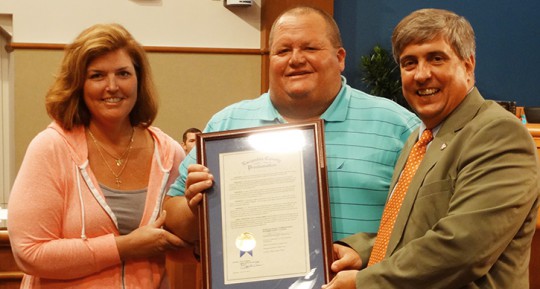Florida Gov’t Weekly Roundup: Should I Stay, Or Should I Go
April 26, 2015
Normally, the next-to-last week of the legislative session would be spent putting the pieces in place for the ceremonial handkerchief drop on the final day of the annual gathering. Lawmakers would be hammering out a budget agreement — with a setback likely to happen over the weekend — and deals on major legislation would be struck.
This has not been a normal session.
 Lawmakers are still trying to get to where they can start negotiations on the state spending plan, and next Friday’s scheduled conclusion of the legislative session long ago became a milestone instead of a finish line. The House and Senate are still an entire health-insurance program and billions of dollars apart on the budget.
Lawmakers are still trying to get to where they can start negotiations on the state spending plan, and next Friday’s scheduled conclusion of the legislative session long ago became a milestone instead of a finish line. The House and Senate are still an entire health-insurance program and billions of dollars apart on the budget.
Some major legislation is starting to get closed out, but other issues are still looming — and getting close to a resolution on reforming the troubled Department of Corrections is cold comfort when lawmakers know they’re going to be back in Tallahassee at some point in May. Or June.
Those who work in the Capitol often express annoyance at the nighttime and weekend meetings that come with the annual budget negotiations. But as they get a taste of quieter days in the final weeks of the session, some of them likely wouldn’t mind a little bit more noise.
HOW TO DANCE WITHOUT DANCING
House Appropriations Chairman Richard Corcoran, R-Land O’ Lakes, infamously delivered a blunt warning to the Senate about its Medicaid expansion alternative early this month: “We’re not dancing.” And while that might be true as far as it goes — the House has shown no signs that it will give in on the program — the two chambers are beginning to look at each from across the dance floor.
The closest thing to a breakthrough that lawmakers had seen in weeks came Thursday, when the House sent an initial offer to the Senate on the broad outlines of a budget.
There is still no agreement on some of the biggest obstacles to a deal, especially when it comes to the Senate’s plan to use Medicaid expansion dollars to help lower-income Floridians purchase private health insurance, but the discussions are something resembling progress.
“While that conversation is a little narrow for our taste right now, at least we’re talking,” said Senate Appropriations Chairman Tom Lee, R-Brandon.
But a key piece of the puzzle could remain at least partially outstanding until after the state’s new budget year begins July 1: With the state submitting a concrete model for the Low Income Pool, or LIP, program to federal officials on Monday, the federal Centers for Medicare & Medicaid Services will not be able to give a final answer to the state by June 30.
Not that some Florida officials weren’t willing to try.
“We are expediting our submission of this LIP model in order to help CMS speed up their decision,” said Agency for Health Care Administration Secretary Liz Dudek. “CMS knows that our budget depends on their rapid response to this model.”
Lawmakers are hoping to get some signs about how much money they can expect from a new version of LIP, currently a $2.2 billion program, set to expire June 30, that is largely used to cover the expenses of uninsured, low-income Floridians who show up at hospitals needing treatment.
The negotiations also followed a tit-for-tat set of meetings Tuesday morning. At a gathering of the full Senate during what was to be a meeting of the Senate Appropriations Committee, lawmakers heard a gloomy picture of what would happen to the state’s economy if the upper chamber’s proposal wasn’t adopted.
Meanwhile, House leaders urged their members to hold strong in the face of an onslaught from business groups, hospitals and editorial boards.
And Gov. Rick Scott said he was ready to call a special session to pass a continuation budget — even if no one in the Capitol had ever heard of a continuation budget.
“If the House and Senate fail to agree on allocations and begin a budget process that can be completed in an extended session, then I will call the House and Senate into a special session to pass a budget that continues current year funding levels for critical services like education, law enforcement, children services, and transportation,” Scott said.
The governor also started calling Republican senators separately into his office to threaten vetoes and use a spreadsheet containing hospital profits to try to get his way. Senators didn’t sound terribly intimidated.
“It tends to galvanize the membership around their president. The most dangerous guy in Tallahassee is always the guy with no hope. So when you extinguish the flame of hope from the members, you give them no reason to negotiate,” Lee said. “So my encouragement would be for us all to put all this behind us and move forward. And that comes from someone who doesn’t entirely have clean hands.”
ALL ABOARD!
With the budget and the negotiating leverage it provides in limbo and time beginning to evaporate, lawmakers started getting creative this week. And that meant so-called legislative “trains,” where multiple bills are combined into single packages. While meant to boost the odds of particular provisions making it into law, the trains just as often derail.
In the Senate Appropriations Committee, more than dozen individual bills eventually glommed onto a single measure (SB 948) that gained approval from the panel. But not before an agreement between Sen. Joe Negron, R-Stuart, and state colleges attracted some controversy.
Negron has been on a crusade in recent years to dial back the number of four-year degrees offered by state colleges, which are largely two-year institutions. After Negron — who could become Senate president after the 2016 elections — threatened more sweeping legislative action, he and the colleges made a deal.
The agreement would explicitly state that four-year degrees are a secondary mission of the colleges and would cap the share of a school’s enrollment devoted to four-year programs, based on where they stand now.
“I think there’s plenty of room for growth, but it isn’t unrestrained, unbridled growth,” Negron said.
Negron has said the increase in four-year programs competes with state universities. Others say the programs are a low-cost alternative for students who aren’t necessarily fresh out of high school.
“Seventy-five percent of the people who earn baccalaureate degrees at our state college system are over 25 years old,” said Sen. Jack Latvala, a Clearwater Republican who is perhaps not coincidentally Negron’s opponent in the Senate presidency race. “In our state university system, 75 percent of those who earn them are under 25 years old. It’s a separate market.”
On Thursday and Friday, the House started its own education train, this one on the floor, when it attached charter school legislation and a proposal dealing with school uniforms to a wide-ranging school choice bill (HB 1145) that has caused some concerns for Democrats.
The bill, which passed on an 80-36 vote, would allow parents to send their children to any school in the state that hasn’t reached capacity, and it would allow non-teachers to enter the classroom in full-time jobs related to their field of expertise — an accountant, for example, teaching a finance class.
“You’re doing a good waltz and you’re doing a bad waltz,” said Rep. Alan Williams, D-Tallahassee. “And when you do that, the dance doesn’t look good.”
Trains were also shaping up on water policy and health-care legislation.
by Brandon Larrabee, The News Service of Florida
Ruth (Judy) Griffith
April 26, 2015
Ruth (Judy) Griffith of Cantonment, was born March 12, 1924, and went to be with the Lord on April 25, 2015. She was 91 years old. She was a loving mother who loved her children. She loved to fish and to be with her family. She always loved going to garage sales and buying other peoples stuff to give it back to someone else. She was a thoughtful person who always put other people before herself. She attended and was a member of Pine Forest Assembly of God Church. She loved her church family and her Pastor, Brother Gene. She will always be in our hearts and prayers. We will miss you dearly.
Judy was married to Donald Manuel Griffith and had five children, Daniel Clifford Griffith (Patricia), Dennis Manuel Griffith (Virginia), Gloria Jeanetta Griffith, Glenda Wonnette Weekley (Edward) and Clifford Cleveland Griffith (Becky); 10 grandchildren; 21 great-grandchildren and five great-great-grandchildren.
She was born in Glen Lyn, WV and is preceded in death by her husband, Donald Manuel Griffith; mother, Elizabeth Perdue; father, Robert Lee Martin; sisters, Madeline Pellizzeri and Ethel Stifford; and brother, Junior Martin.
Visitation will take place Wednesday, April 29, 2015, from 6 p.m. until 8 p.m. at Faith Chapel Funeral Home North.
Funeral services will be held at 10 a.m. on Thursday, April 30, 2015, at Pine Forest Assembly of God with Bro. Gene Hudson officiating.
Burial will follow in Pensacola Memorial Park Cemetery.
Pallbearers will be Danny Ray Griffith, Donald Lynn Griffith, Dennis (Bubba) Griffith, Wayne Clifford Griffith, Coy Edward Carter, III, Jason Donald Weekley and Joshua L. Weekley.
Faith Chapel Funeral Home North is in charge of arrangements.
Oil Field Worker Severely Burned In Saturday Fire
April 25, 2015
An oil field worker was critically injured in a fire Saturday morning outside Flomaton, AL. The worker as transported to Sacred Heart Hospital in Pensacola and then transferred to the USA Burn Center in Mobile.
The fire occurred at an oil facility off Wolf Log Road. When the first firefighters arrived on scene, they found an large “container” of oil on fire, according to Flomaton Fire Chief Steve Stanton.
A medical helicopter was requested to transport the burn victim, but the helicopter was unavailable due to weather.
The Flomaton, Friendship, and Pineview volunteer fire departments from Alabama and the McDavid and Century stations of Escambia Fire Rescue from Florida were dispatched to the blaze. The Escambia County (AL) Sheriff’s Office and Flomaton Police Department also responded.
Further details, including the name and latest condition of the worker, have not been released.
Pictured: Black smoke rises from an oil fire north of Flomaton Saturday morning. Photo for NorthEscambia.com, click to enlarge.
Escambia County Honors Longtime Firefighter KC Fehl
April 25, 2015
The Escambia County Commission has issued a proclamation in honor of longtime volunteer fireman K.C. Fehl upon his retirement.
Fehl retired from Escambia County Fire Rescue on April 1 after 28 years of service. He joined the Cantonment Volunteer Fire Department in January 1987 after his interest in fire service was sparked by a neighbor’s yard fire. He was promoted to the rank of lieutenant in late 1990 and then soon reached the rank captain.
He left the Cantonment VFD for a short time to serve with the Molino Volunteer Fire Department before returning to Cantonment.
Fehl left the fire department in 2003 to start his service as an Escambia County Sheriff’s Office reserve deputy where he served until 2010. He moved to the Cantonment VFD’s board of directors so he could spend more time with his son by coaching his baseball team. In December 2005, he switched to “line duty” with the VFD as a driver with his son Kenny, who is now a career firefighter. Fehl was soon, once again, promoted to lieutenant and then to assistant chief. He also served the Ferry Pass fire district for just over a year.
“With his retirement, Escambia County has lost an invaluable resource that will be impossible to replace,” the county’s proclamation stated.
Commissioners congratulated Fehl, and his wife, Susan Fehl, for their years of service.
Pictured top: Susan Fehl, K.C. Fehl and Escambia Commissioner Grover Robinson. Photo for NorthEscambia.com, click to enlarge.
Abortion Waiting Period Awaits Scott’s Signature
April 25, 2015
A bill that would require 24-hour waiting periods before women can have abortions is heading to the desk of Gov. Rick Scott, following passage Friday in the Florida Senate.
By a vote of 26-13, the Republican-dominated Senate approved the bill (HB 633), which the House passed Wednesday. The Senate vote was along straight party lines.
“There is nothing I will be more proud of than to be a voice for the unborn,” Sen. Anitere Flores, a Miami Republican and the Senate sponsor, said in her closing statement.
Flores said the bill would add a day-long waiting period to the current requirements for informed consent before women can have abortions in Florida. The current requirements include discussing such issues as medical risks to the woman and fetus, a description of the fetus and a list of entities that offer alternatives to terminating pregnancies.
“All that we’re requiring is that it be done 24 hours prior,” she said.
Lawmakers earlier this week approved adding exceptions for victims of rape, incest, domestic violence or human trafficking to the bill. However, those victims could only get waivers of the 24-hour waiting period if they can produce police reports, restraining orders, medical records or other documentation.
“All of this documentation is unnecessary government intrusion into the lives of women,” said Sen. Geraldine Thompson, D-Orlando.
Flores on Thursday fended off a series of amendments that Democrats said would alleviate hardships on women for whom two trips to abortion clinics in other counties could put the procedure out of financial reach.
“Seventy percent of the counties in this state don’t have an abortion provider,” Sen. Maria Sachs, D-Delray Beach, said Friday.
Meanwhile, Sen. Darren Soto, D-Orlando, said he opposed the bill because it was unconstitutional.
“Under the Florida Constitution, we have a right to privacy,” he said. “I would not be surprised to see this bill challenged immediately.”
After the vote, Laura Goodhue, executive director of the Florida Alliance of Planned Parenthood Affiliates, said the bill’s opponents would turn their attention to urging Scott to veto the measure.
“But should he sign it, advocates for reproductive rights will take whatever steps possible to ensure women’s access to health care is guaranteed without delay,” Goodhue wrote in an email.
A Scott spokeswoman said he would review the bill before making any decision.
As with other debates as the bill moved toward passage, Friday’s discussion juxtaposed a woman’s right to choose with the sanctity of life.
“As a woman, that should be my right (to make reproductive decisions),” said Senate Minority Leader Arthenia Joyner, D-Tampa.
“This is not a medical procedure,” said Sen. Rob Bradley, R-Fleming Island. “This is a life.”
Sen. Jeff Clemens, D-Lake Worth, said the bill really is about “restricting access” to abortions. Clemens said there were better ways of reducing the number of abortions, such as spending money on sexual health, family planning and sex education.
“But instead of doing those things that are proven to work, we’re basically trying to find a way of restricting women’s access,” he said.
However, Sen. Kelli Stargel, R-Lakeland, said the measure “does not limit a woman’s right to have an abortion.”
“It’s making sure we have the same standard for women as we do in every other medical procedure, and that there is not a business, the business of abortion, trying to take advantage of women and trying to play on their emotion and talk them into something that they make money on and you spend the rest of your life regretting,” Stargel said.
Planned Parenthood’s Goodhue said such charges “are simply not true.”
“Our physicians, nurse practitioners and family-planning assistants all work hard every day to provide high-quality, non-judgmental, affordable health care to women and men to enable them to make the right decision for them,” Goodhue wrote in an email. “Decisions about whether to choose adoption, end a pregnancy or raise a child should be left to a woman, her family, her faith and her health care provider.”
Stargel also said that pregnancies resulting from rape, incest, domestic violence or human trafficking provide “all the more reason to reflect” before having an abortion.
by Margie Menzel, The News Service of Florida
Escambia Man Facing Child Porn Charges
April 25, 2015
An Escambia County man had been indicted on multiple child pornography charges by a federal grand jury.
 Kandel Marki Whiting, 35, is charged with receipt, distribution and possession of child pornography. He is accused of receiving and distributing images and videos of child pornography between October 2014 and January 2015. And in March, prosecutors said he knowingly possessed porn involving a prepubescent minor and a minor younger than 12. Whiting’s conduct came to light based upon his use of the social media applications Twitter and Kik.
Kandel Marki Whiting, 35, is charged with receipt, distribution and possession of child pornography. He is accused of receiving and distributing images and videos of child pornography between October 2014 and January 2015. And in March, prosecutors said he knowingly possessed porn involving a prepubescent minor and a minor younger than 12. Whiting’s conduct came to light based upon his use of the social media applications Twitter and Kik.
Whiting was arraigned in federal court in Pensacola Friday before United States Magistrate Judge Miles Davis.
The case is being investigated by the United States Immigration and Customs Enforcement (ICE) Homeland Security Investigations (HSI), Pensacola Police Department, and the other agencies that are part of the Northwest Florida Internet Crimes Against Children Task Force, whose joint investigation led to the charges in this case. It is being prosecuted by Assistant United States Attorney David L. Goldberg.
April Is Distracted Driver Awareness Month
April 25, 2015
Keep your hands on the wheel, eyes on the road and mind on driving — that’s the message the Department of Highway Safety and Motor Vehicles (DHSMV) and the Florida Department of Transportation (FDOT) want motorists to remember this April during Distracted Driver Awareness Month.
 Distracted driving crashes in Florida have increased 25 percent since 2012. Even though teens represent only five percent of licensed drivers, they were responsible for 12 percent of distracted driving crashes. Drivers aged 20–29 were responsible for 31 percent of crashes.
Distracted driving crashes in Florida have increased 25 percent since 2012. Even though teens represent only five percent of licensed drivers, they were responsible for 12 percent of distracted driving crashes. Drivers aged 20–29 were responsible for 31 percent of crashes.
“If you are not 100 percent focused, then you’re not 100 percent driving,” said Col. David Brierton, director of the Florida Highway Patrol. “Troopers around the state will continue to educate motorists on the dangers of distracted driving for the safety of all who share our roadways.”
There are three main categories of distraction: visual (taking your eyes off the road), manual (taking your hands off the steering wheel), and cognitive (thinking about anything other than driving). Some of the most common types of distractions include:
- An object, person, or event outside of the vehicle that divert a driver’s attention away from the road
- Texting
- Reaching for a device such as a GPS
- Interacting with passengers
- Eating or drinking
- Unsecured pets
- Grooming
- Adjusting stereo or climate controls
- Lighting a cigarette
- Daydreaming
Jim Allen Elementary Students Take Part In 4-H Speech Contest
April 25, 2015
Fourth graders at Jim Allen Elementary School took participated in the Tropicana 4-H Speech Contest on Friday.
First place was awarded to Destiny Williams, second to Joshua Jones and third to Savannah Guilford.
Fifth graders will also take part in the contest later this school year.
Pictured top: Jim Allen Elementary Tropicana 4-H Speech Contest winners (L-R) Savannah Guilford, third place; Joshua Jones, second; and Destiny Williams, first. Below: Fourth grade participants. Submitted photos for NorthEcambia.com, click to enlarge.
‘Growlers’ Going To The Governor
April 25, 2015
Half-gallon “growlers” are closer to going under brewery taps across Florida.
The House on Friday joined the Senate in supporting the end of the state’s prohibition on brewers being able to fill 64-ounce containers known as “growlers” for off-site consumption. Currently, brewers can only fill containers of other sizes.
“Let’s all just push the button and free the growler here in the state of Florida,” Majority Leader Rep. Dana Young, R-Tampa, said before the House voted unanimously to approve the bill.
A heavily lobbied issue in the Capitol, the measure (SB 186) now will go to Gov. Rick Scott. A spokeswoman said Friday the governor will review the bill once it reaches his desk.
Rep. Chris Sprowls, a Palm Harbor Republican who sponsored the bill in the House, said the legislation allows “entrepreneurs, artists, people who care about innovation and business, to continue to prosper in our state.”
But Rep. Darryl Rouson, D-St. Petersburg, said that while he supports letting small businesses grow, the state needs to be mindful of the proliferation of alcohol.
“And yes … 64 ounces is not enough for a true professional drinker, but it’s a crack in the door,” said Rouson, who has been both homeless and a drug addict.
Craft brewers sought the growler change in recent years, but the proposal was scuttled amid objections from large beer distributors. The distributors pointed to a need to protect the state’s Depression-era three-tier regulation system, which requires the manufacture, distribution and sale of alcoholic beverages to be separated.
The bill was filed this year as a straightforward attempt to repeal the ban on the containers, which are considered the most popular size among “growler” aficionados.
But as expected, the final bill took on additional issues while going through the committee process.
The final product that will be served to Scott includes regulations that would limit cup sizes to 3.5 ounces for beer tastings, ban the use of electronic-benefits transfer cards — formerly known as food stamps — to buy alcoholic beverages and cap at eight the number of tap-room licenses a single brewer can hold.
Byron Burroughs, a founder of Proof Brewing Co. in Tallahassee and a Florida Brewers Guild board member, said some brewers may be upset at the cap, but he has a more optimistic view of the bill.
“The distributor lobbyists have been doing everything they can to stop the number of licenses we can hold, the amount of beer we can transfer between locations,” Burroughs said. “The most important aspect of this bill defines what we can and can’t do. I think it puts us in a much stronger position to reinvest and grow.”
Breweries have been operating since 1963 under a tourism exemption intended to allow on-site alcohol sales. While there is a cap on how many locations each brewer can have as part of the bill, they may no longer have to rely on the tourism exemption to exist.
The bill would allow the Division of Alcoholic Beverages and Tobacco within the Department of Business and Professional Regulation to issue vendor licenses to businesses located within a single complex that includes a brewery.
by Jim Turner, The News Service of Florida
Molino 16U Lady Jags Win Mid Season Tournament
April 25, 2015
Both of the Molino 16U Molino softball teams won championships in their mid-season tournaments.
The Lady Jaguars coached by Donnie Nicholson and Mike King advanced to the championship game undefeated. After concluding the day after a five-hour rain delay, the Jags lost the first game of the championship series 5-4 before coming back strong in the second game with an 8-5 win over the East Milton Buckshots.
Pictured: (front, L-R) Sky Gorum and Kaelyn Coffee, (middle) Ashley Ragsdale, Jasmine Crabtree, Trista Loranza, Mika King, Rena Banks, Jamia Newton, Abi Mansoso, (back) Coach Donnie Nicholson, Catherine Jerigene, Meredith Morgan and Coach Mike King. Submitted photo for NorthEscambia.com, click to enlarge.






